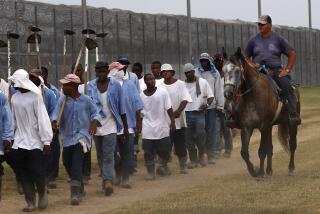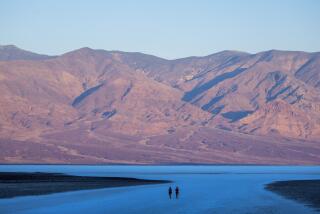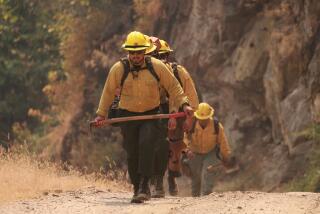Medical Staff Set as Troops Begin to Feel the Heat
- Share via
SAUDI ARABIA — The U.S. military is treating about 15 cases of minor heat stress a day as it rushes to finish a tent hospital reminiscent of the television series “MASH.”
Already up and running at the air-conditioned, 50-bed facility are a small ward for outpatient care and an overnight ward. A two-bed operating room was expected to be ready by day’s end.
So similar is the “air-transportable hospital” to the TV series that the facility’s commander, Maj. Rich Williams, said that doctors, nurses and other personnel have begun joking about their resemblance to the show’s cast.
Williams told one reporter that he had become the group’s Col. Sherman Potter, the character who commanded the MASH unit.
So far, most people coming to the hospital for treatment have been suffering from minor heat stress as temperatures hover in the 100s. The usual treatment is rehydration by drinking water. In more severe cases, patients are given intravenous injections of nutrient-laden fluids.
Williams said there have been no reported cases of heat stroke, a more serious ailment. He said the overnight ward has not been needed, but added, “I’m sure it will be by tonight.”
In the outpatient ward, several patients were being treated for heat stress. One was receiving intravenous fluids.
“This is your fault, colonel,” the man joked to his commanding officer, Col. John McBroom, who laughed.
A 28-year-old sergeant from Sarasota, Fla., said he had felt ill after several hours of swinging a sledgehammer while setting up tents in near 100-degree weather.
“I didn’t take enough breaks at all,” he said.
U.S. troops are being told to drink at least six gallons of water a day, but even with that several interviewed have said they are finding it impossible to adjust to the desert heat.
“We’ll never get used to it. All we can do is drink and drink and complain a bit,” an Air Force captain said.
“If you asked everybody, they’d all say we’d rather go home but we’ve got a job to do,” an Air Force sergeant said.
McBroom visited the tent site and told the men and women to knock off work until nightfall, when temperatures generally drop into the 80s.
“Ninety-five percent of them will go so hard at it, even in this heat, that you have to pull them back,” the colonel said.
Also receiving treatment at the hospital was a tank gunner from the Army’s 82nd Airborne who had aggravated a finger fracture and an air Force colonel who had popped a dental crown and was having it repaired by a dentist.
The hospital’s chief nurse, Lt. Col. Susan Helm of Goodrich, Mich., said the hospital staff expected that they would eventually have to treat patients with diseases related to food, water and improper sanitation.
Williams said that hepatitis A and some parasitic infections are common to Saudi Arabia, and malaria is a concern in some parts of the kingdom.
The hospital is near an air-conditioned tent city being built to accommodate at least 1,100.
More to Read
Sign up for Essential California
The most important California stories and recommendations in your inbox every morning.
You may occasionally receive promotional content from the Los Angeles Times.










